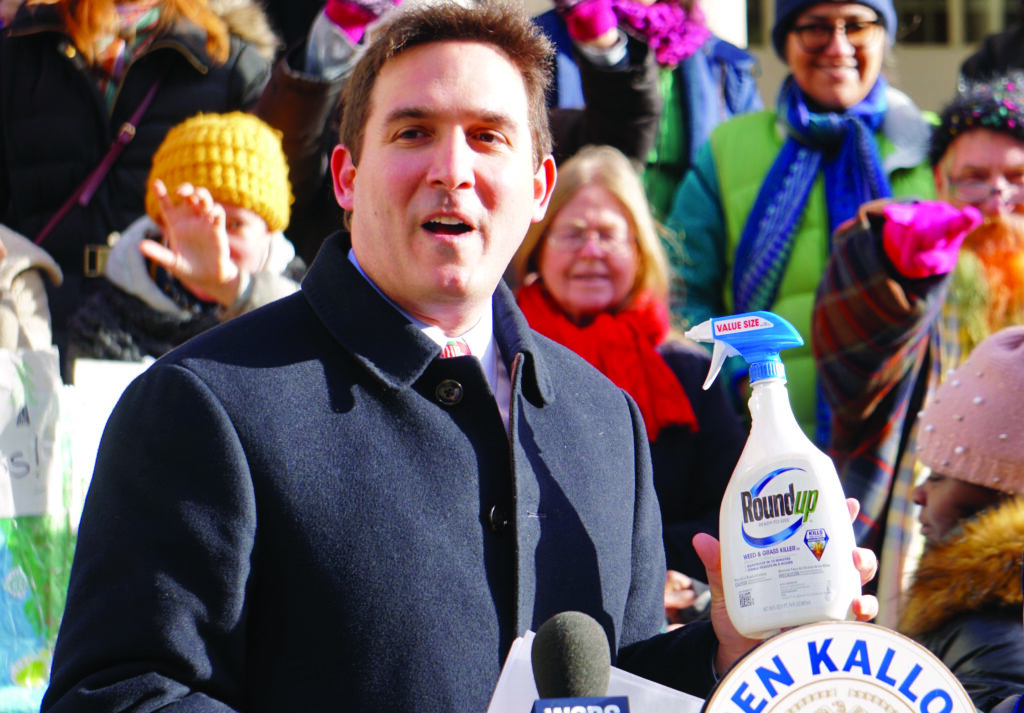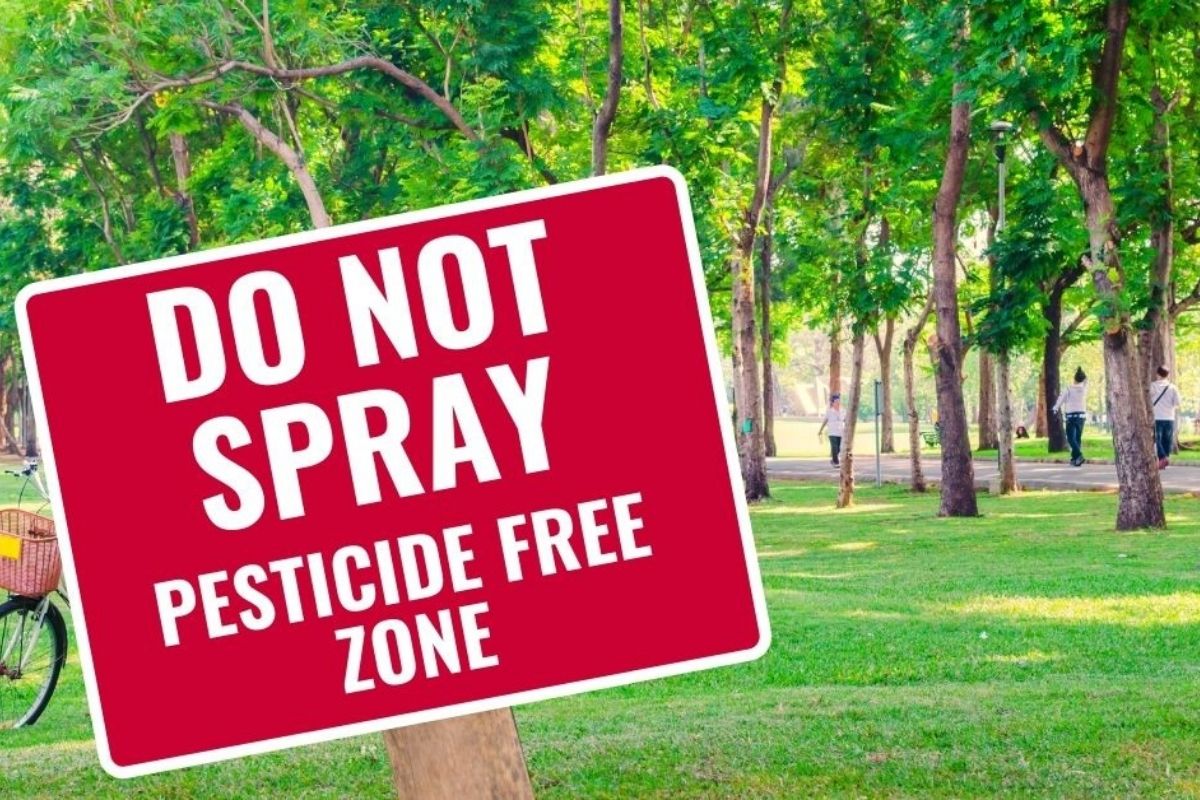by Nicole Rivard and Scott Smith
Many people have said that the children hold our future in their hands. If the group of kindergartners who pushed New York City to ban toxic pesticides in parks and playgrounds is any indication, then there’s hope for the planet’s future and its inhabitants.
Last spring, NYC became the nation’s largest city to ban synthetic pesticides and herbicides like glyphosate, the main ingredient in Roundup, on all city property except golf courses and playing fields.
Thank you to our members who pressed their council members to vote for the ban. It had been seven years since the idea sprouted in Paula Rogain’s class in P.S. 290 in Manhattan.
Today more than 150 communities throughout the U.S. have passed policies that restrict the use of toxic pesticides, according to the national nonprofit Beyond Pesticides. That includes Stamford, Connecticut, near Friends of Animals’ headquarters.
Last September, in addition to establishing a list of “permanently banned products” that include glyphosate, 2,4-D, the neonicotinoids and chlorpyrifos, Stamford began requiring only the use of products certified by the USDA National Organic Program. It also recognized the dangers posed by fossil-fuel based synthetic fertilizers to the climate and local waterways due to nutrient runoff.
Here we take a closer look at the pesticide ban movement to inspire you to get toxics out of your own community. It takes a lot of work and commitment, but it can be done with perseverance.
No one knows that better than NYC Council Member Ben Kallos, who the schoolchildren persuaded to introduce the ban.
“I have a young daughter, and NYC’s parks are our sanctuary. I need to know that when I bring my daughter to the park she can play in the grass without being exposed to any toxic chemicals, and every family in NYC needs to know that too,” said Kallos, whose eight-year tenure ended Dec. 31.
“This is a very straightforward idea that was just as clear, if not more so, to the kindergartners as it is to you or me.” The legislation gained momentum from the support of environmental groups and public-housing residents.
“Environmental issues are sometimes unfairly and inaccurately portrayed as wealthy white concerns. But when you look at this issue through an environmental justice frame, you see that in fact, most toxic pesticides were being used in communities of color,” Kallos explained.
“The Black Institute’s ‘Poison Parks’ report and its president Bertha Lewis’ advocacy showed that this was impacting parks in communities of color, as well as the parks workers being told to spray the pesticides, who are most often Black or Latino.”
Kallos believes that if the largest city in the country can ban pesticides, any community can.
“My hope is that the example we set shows that it’s time to move away from toxic pesticides, just like it’s past time to move away from fossil fuels. If we care for our parks with natural management, we can reduce our reliance on the mega corporations who produce these pesticides and build healthier, sustainable public spaces for our communities,” he said.

PORTLAND, MAINE
In 2018, Portland, Maine’s largest city, banned the use of synthetic pesticides on city-owned land and private property. City workers now apply only organic pesticides when maintaining parks and recreational fields, with just a few exceptions, such as dealing with invasive insects or plants.
And Portland residents can no longer use synthetic pesticides at home, although they can seek a waiver if they’ve shown that they’ve exhausted all alternative methods and choose to use “the minimum amount of the least toxic, most effective pesticide necessary,” the ordinance states.
The ordinance is one of the strongest anti-pesticide laws in the country.
Maine is one of only six states that allows pesticide law preemption, enabling it to apply pesticide restrictions to private property. Most states have laws that prevent localities from enacting pesticide policies stricter than the state’s.
“The ordinance isn’t perfect,” said Avery Kamila, who writes the Vegan Kitchen column for the Portland Press Herald and is one of the organizers of Portland Protectors, which advocates for organic lawn care and reduced pesticide use.
“However, it has done a tremendous job of moving the city’s Public Works department, which used to spray the sidewalks with Roundup, and the independent lawn businesses working in Portland to organic land care.
“What’s more, the two independent hardware stores in the city have also switched to 100 percent organic lawn care products, even though sales of synthetic pesticides aren’t regulated by the ordinance,” Kamila adds.
And while the City of Portland Municipal Golf Course is exempt from the ban as long as it is certified through Audubon International’s Cooperative Sanctuary program, Kamila said the course reduced its synthetic pesticide use by 50 percent after Portland Protectors issued a report on its practices as part of the campaign for the ordinance.
“One of the things we did to win is that we networked with a lot of related groups,” she said. “I do think the high number of vegans and vegetarians and animal rights advocates in Portland definitely helped with our campaign.”
SOUTH MIAMI
With its hot, humid climate, expansive wetlands and status as a global port of call, Florida has long had serious issues dealing with pests, both native and exotic. It’s also a state that has often paid lip service to protecting wildlife and the environment while catering to special interest groups like land developers who lobby for unchecked growth and deregulation.
That’s why it was so important when the City of South Miami became the first organic community in Florida. Passed in 2019, the landmark ordinance bans the use of hazardous synthetic chemicals on public property in favor of certified organic or minimum risk products. The law also mandates safer, more sustainable practices like manual weed removal as a first line of treatment, the application of vinegar as a secondary line of defense and the use of approved “Certified Organic or EPA Minimum Risk” pesticides and herbicides as a “last resort.”
Significantly, although South Miami residents face the ongoing threat of mosquito-borne diseases, including a serious outbreak of the Zika virus in 2016-17, the new law has enabled the municipality to successfully control mosquito populations with safer alternatives to widely used synthetic pesticides. Aided by a City Commission vote in 2014 to declare South Miami a wildlife sanctuary, then Mayor Dr. Philip Stoddard restricted the use of highly toxic mosquito adulticides such as malathion and chlorpyrifos, which are also toxic to other insects, birds and mammals—including humans.
“The synthetic chemical pesticides are all neurotoxic, especially to children because their brains are still developing,” Stoddard said. “These chemicals are not even effective in controlling the mosquitos, whose populations recover rapidly following a spray application, in part because their natural predators, like spiders and dragonflies, are incapacitated by the insecticides.”
The move also protected populations of the state’s rare bonneted bat, which begins to feed on mosquitoes in the spring at the same time spraying usually begins.
“We did approve the use of BTI, a bacterial larvicide, in our downtown restaurant district,” Stoddard said. BTI presents no risk to humans nor to other insects except midges. Its application involves releasing millions of non-biting male mosquitoes infected with naturally occurring, biodegradable bacteria to mate with wild female mosquitoes. The bacteria prevent the survival to adulthood of any offspring produced when the mosquitoes, bred by Kentucky-based MosquitoMate, mate with wild female mosquitoes. This drives down the population of Aedes aegypti mosquitoes that can spread Zika, dengue fever and chikungunya.
“It was the only agent that proved effective in the Zika outbreak,” Stoddard said. Term limited in 2020 after serving a decade as mayor, Stoddard is back at his day job—professor of biological sciences at Florida International University. He credits Beyond Pesticides for helping South Miami go organic. When asked whether getting the city to give up toxic pesticides has led residents to go organic in their backyards as well, Stoddard said “either they thought I was crazy and did nothing different or it raised their consciousness.”
We’re guessing that consciousness has been raised, and then some.
In NYC, the time it took to raise awareness about organic land care was well worth the wait. “It was such a joy to finally get this done because so many people have been working for it for so long,” Kallos said.
“The kindergartners who first brought this to my attention are in middle school now, and several of them were still helping us get this bill over the finish line.”

